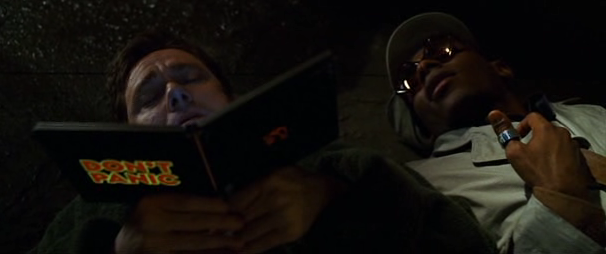What is the Hitch Hiker's Guide to the Galaxy really about?

The Hitch Hiker’s Guide to the Galaxy is about life, the universe, and everything, … and the fact that it makes no sense. Life makes no sense. Nothing that happens makes any sense. There is no purpose, to meaning, no answer, just an endless series of coincidences, catastrophes, and occasionally good times which we just have to put up with until we die. This is the thesis of HHGTTG, and also a good bit of Douglas’s other work.
The story is told through the Book, or rather, the Guide. The Guide is the voice of the narrator, who spends most of his time talking about the book, that most famous of all books to come out of the great publishing houses of Ursa Minor Beta, and which the narrator notes, is the subject of the whole story in the first place. Arthur is just a new reader of the book, Ford an old writer for the book, and the other characters embody it’s general philosophy: that the universe is fucked up (Marvin), and you might as well just try to have fun (Zaphod).
All of them have essentially zero control over their own lives, even when they think they do. Trillian and Ford seem to have wilfully chosen to just hang on for the ride, and Zaphod seems to be doing the bidding of unknown voices in his brain. Even the hyper-intelligent trans-dimensional aliens can’t figure out what to make the answer to the Ultimate Question, or prevent a bunch of bungling bureaucrats from messing up their shot at obtaining the Question. I’m not trying to belabour the plot here, just point out that it makes sense only if you realize that Douglas is trying to tell you that it doesn’t make any sense at all. The Big It. Everything. Nothing Makes Sense.
It’s like that moment in the Simpson’s when the lawyer invokes the Chewbacca Defence. It doesn’t make sense. That what the Hitch Hiker’s Guide is all about.
So you can’t shoehorn that into a movie about romance and character development and happy endings. All of the best material, what Douglas created, is the ultimate joke of the pointless randomness of life. And that’s not only what Douglas’ story is about, but what the book inside the story is about. That’s why the backbone of any good retelling of the story must make the book itself the central fixture and the backbone of the narrative. Keep as much of Douglas’s precisely crafted dialogue in place as possible, and don’t worry too much about plot or character development. Make sure that when the audience finds out that the answer, after all that time, searching, questing, is 42, that they laugh in the knowledge that it doesn’t make any sense, and it doesn’t have to, and you’ll feel better if you don’t worry about it and just go along for the ride.
And maybe, after the pointless early demise of the author himself, in a fashion so fitting that it ought to have been written by him, we’ll eventually get an ultimate movie version that does justice and helps us all feel a bit better about losing him before he could write so many more great works.